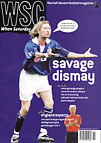 Players threaten to strike over money
Players threaten to strike over money
It’s rare for newspapers to get the chance to report on an old fashioned trade union dispute these days. But the coverage of the PFA’s row over the share of revenue from the new TV contract has provided an opportunity to trot out some of the old stand-bys that were common currency in the strike-heavy Seventies.
Two themes recur constantly in the coverage. One is the salary drawn by PFA chief executive Gordon Taylor which makes him, according to the Daily Express, “by far the highest-paid union leader in the country”. It’s been a long time since the “champagne socialist” gibe has been used without irony. But for those too young to remember, union activists are meant to conform to a certain image for personal frugality and cause outrage among those making the case for the employer if they don’t. “You’re supposed to be standing at the door of your employers with a begging bowl,” says Gordon Taylor. “It’s archaic and insulting.” The other is the fact that the PFA spent £2 million securing a work of art by LS Lowry. This is proof that they have more money than they know what to do with, apparently.
Neither issue has the remotest bearing on the substance of the dispute, of course. Even some of the most extreme ranters in the press, such as the Sun’s John Sadler, agree that the PFA has a case, even if they do not concede the right to strike over it. In fact, if they did, he argues, “their foolishness would be laid bare, their arrogance reaching beyond contempt”.
The facts are these. Until 1988 the PFA took ten per cent of any TV money earned by football as compensation for the fact that players waived any right to be paid extra for appearing in televised games. Then, in order to head off one of the super league breakaway proposals then doing the rounds, Gordon Taylor agreed to give up half that percentage for the duration of the 1988-92 TV deal. In 1992, when the nascent Premier League tried to hold the PFA’s share down, Taylor threatened a strike and received support from his members by a margin of 548 votes to 37. A compromise was reached, but while TV revenues have exploded since then, the union has been unable to restore the original agreement in full.
Now the same arguments are being replayed again. Once again, the Premier League bosses such as Ken Bates and Peter Ridsdale claim fatuously that the PFA represents “greedy” players. In fact, of course, if they money were retained by clubs such as Chelsea and Leeds, it would go straight into the pockets of those who need it least, while the PFA has demonstrated robustly that it uses the cash to help those less well used by the game, and to foster the Football in the Community schemes it pioneered. The very weakness of the clubs’ case is surely the reason why LS Lowry has played such a curiously prominent role in the “debate”.
The contempt for the players in the coverage of the strike story has been mirrored in the attention given to the four Chelsea players and friends who were drunk and disorderly in a Heathrow hotel on the night the UEFA Cup match against Levski Sofia was called off. There’s no doubt that they did really disgrace themselves, but the vehemence of the backlash (“Sickening” said the front page of the News of the World) owes much to the fact that it provided the press with yet another opportunity to hark back to simpler times.
Seventies “maverick” Rodney Marsh responded to the news of the Chelsea’s players’ widely-reported drunken escapades in a Heathrow hotel thus: “The late great Bobby Moore could party with the best but he never got involved in anything so distasteful.” Nigel Clarke in the Express also has tales to tell of England’s most famous captain, all of them dating back to a time when “alcohol-fuelled pranks had an innocence about them that rarely led to violence”, so unlike the belligerent “young millionaires” of today.
But Seventies players were in fact often criticised by preceding generations for their popstar excesses just as footballers today are adjudged to have too much money. Usually it is those club owners who have themselves amassed fortunes from their association with football who point the finger.
Then as now it is the players who generate most of the game’s wealth and they are resented for it, more so when they appear prepared to strike in support of fellow union members. Money is supposed to alleviate any sense of social responsibility – most club chairmen could tell you that.
From WSC 177 November 2001. What was happening this month